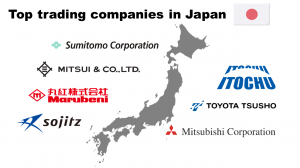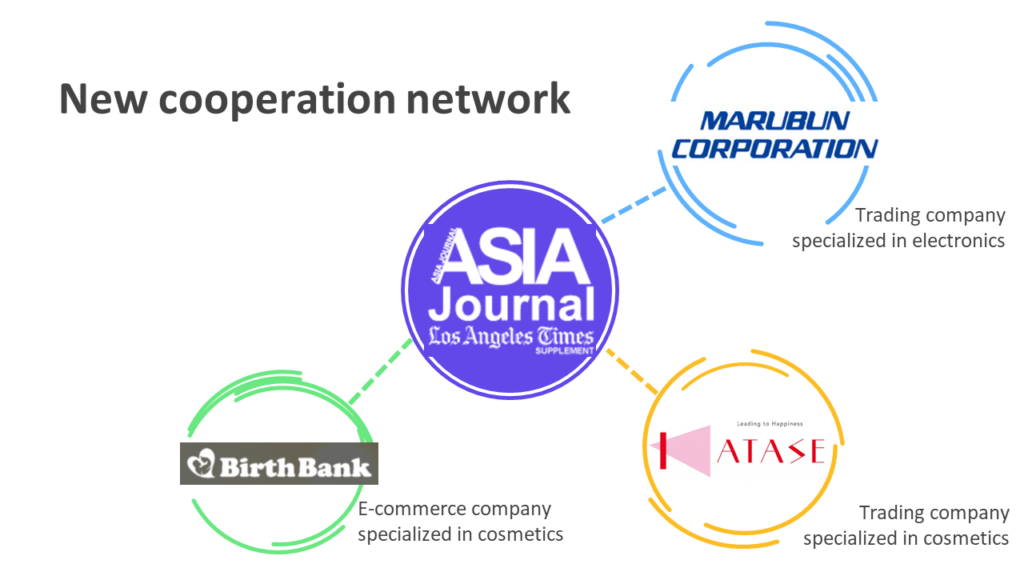Japan has a unique business system compared to other countries. It is no exaggeration to say that all of Japan’s economies are working around the trading company (‘Shosha’ in Japanese).
There are three main categories of ‘Shosha’: a General trading company (‘Sogo shosha’ in Japanese) and a specialized trading company, which is bifurcated by its affiliates and sizes.

After World War II, Sogo shoshas with a great deal of capital, such as Mitsubishi Corporation, Sumitomo Corporation, MITSUI & CO., LTD), MITSUI GROUP, ITOCHU Corporation, Marubeni Corporation, Toyota Tsusho Corp., Sojitz Corporation), purchased or exported many products in order to deliver supplies of oil resources, crops and minerals to Japan. It is noteworthy that Sogo Shosha does not limit the categories they deal with. They carried whatever item was profitable. In South Korea, there have emerged a few general trading companies that are seeking to benchmark Sogo Shoshas, and now they’re operating in the form of Specialized trading companies.
On the other hand, specialized trading companies have limited handling items such as electronic components and food. Instead, the specialized trading company under the group incorporation is a member of affiliates and serves as a supplier to various affiliates in the group. However, the independent and small-sized specialized trading company does not belong to a group, and expands its own independent trade network. Most Japanese companies manufacture or sell products, using supplies from trading companies. Global supply chain is being activated in tandem with trade deals of trading companies. A Shosha sells its products directly to retailers such as department stores and home appliance retailers, as well as manufacturers that produce certain products.
As such, there are about 6,500 Shoshas, which forms Japanese unique business ecosystem, including general trading companies (Sogo shosha) and specialized trading companies. Since World War II, They have powered up economic growth in Japan, even today, when the COVID-19 crisis is taking place.

Sogo shoshas made significant investments in convenience stores, fashion companies, energy companies, food companies, TV home shopping companies, and steel companies with their capital. And thanks to a number of trading companies, including general trading companies (Sogo shosha) and specialized trading companies (Shosha), Japan has been able to grow their logistics, and it has been able to have a strong domestic market even during the long-term recession.
Los Angeles Times Asia Journal is now about to build another cooperation network with Shosha which is named Marubun. Marubun in Tokyo is a trading company which is specialized in cutting-edge electronic products. Marubun is able to provide support in collaboration with group companies in all areas—from pre-installation consultations to system proposals, installation, operational training, and technical support—that it is able to provide the products that it does.
Many companies around the world will have to understand this characteristic of Japanese unique business ecosystem driven by trading companies to work with them to find a breakthrough. Furthermore, through business cooperation between Japanese companies and LA Times Asia Journal, it is expected that the East Asian market will be revitalized actively.Also, LA Times Asia Journal is in talks with another two commerce companies in Japan: Katase and Birthbank. Katase, which is headquartered in Osaka and has offices in Tokyo and Fukuoka, has its global networks which is specialized in cosmetic trade. Birthbank is an e-commerce business. Birthbank has online stores mainly in its own website, Rakuten Ichiba, Amazon and other major domestic online malls, and the company is engaged in mail-order business centered on its own products, speeding up the creation of online stores, product development and development.
Mike Choi
Asia Journal
(Los Angeles Times Advertising Supplement)



